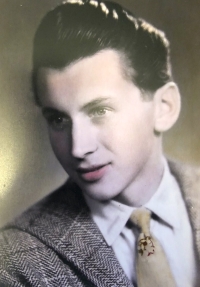Accidentally dropped aerial bombs killed four of my classmates

Download image
Miroslav Kotlas was born on January 17, 1933 in the village Perknov near Německý (Havlíčkův) Brod. He grew up in the modest circumstances of a working-class family. His father worked as a stonemason during the summer and his mother knitted gloves at home. In September 1939, he entered general school in Brod. Five years later, in November 1944, four of his classmates fell victim to an unfortunate air raid when an allied bomber dropped several aerial bombs on the town. He wanted to warn his classmates, who at that time were transporting old collection paper, of the impending air raid. After the war, he graduated from a carpentry school and, by order of the district national committee, was forced to leave to work in Ostrava. He spent less than a year on the construction site at Klement Gottwald’s Nová huť, and before completing his mandatory military service, he became a civilian employee of the military administration of the Czechoslovak people’s army. From 1955 he worked for the railway administration and joined the Communist Party. A career rise followed; he rose to the position of foreman and later worked as an administrator of the cultural center. After leaving the Communist Party, he worked as a railway worker until his retirement. In January 2023 the witness celebrated his 90th birthday and at the time of filming, in February 2023, he lived in Havlíčkův Brod.
